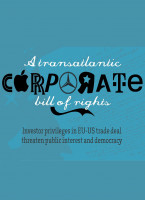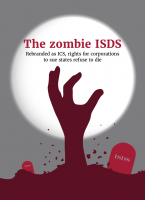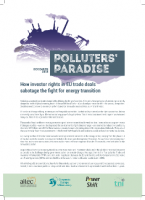Taxes on trial How trade deals threaten tax justice
Demands for tax justice have resounded worldwide, with growing anger at the tax practices of corporations such as Google and Starbucks. Yet trade and investment agreements are already constraining the ability of governments to impose fair tax deals and with the Transatlantic Trade and Investment Partnership (TTIP) this could become worse.
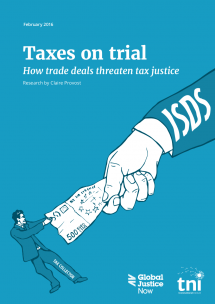
Authors
Governments must be able to change their tax systems to ensure multinationals pay their fair share and to ensure that critical public services are well funded. States must also be able to reconsider and withdraw tax breaks previously granted to multinationals if they no longer fit with national priorities.
But their ability to do so, to change tax laws and pursue progressive tax policies, is limited, thanks to trade and investments agreements. In rapidly developing ‘corporate courts’, formally known as investor-state dispute settlement system (or ISDS), foreign investors can sue states directly at international tribunals.
This system has become increasingly controversial thanks to negotiations over the proposed Transatlantic Trade and Investment Partnership (TTIP) deal between Europe and the United States. But access to ISDS is already enshrined in thousands of free trade and investment agreements crisscrossing the globe.
Because control over taxes is seen as core to a country’s sovereignty, many states have included tax-related ‘carve-out’ clauses in these trade and investment treaties to limit ability of corporations and other investors to sue over such disputes. But a growing number of investor-state cases have in fact challenged government tax decisions – from the withdrawal of previously granted tax breaks to multinationals to the imposition of higher taxes on profits from oil and mining.
Analysis of data and documents on hundreds of ISDS cases filed so far reveals that foreign investors have already sued at least 24 countries from India to Romania over tax-related disputes – including several cases where companies have used this system to successfully challenge – and lower – their tax bills.
How ISDS threatens tax justice
• Under the current system, states can and have been sued for changing tax laws, revoking tax breaks, and increasing corporate, income and other taxes
• A tax ‘carve-out’ written into a trade or investment treaty doesn’t necessarily prevent taxes being challenged – it can just give the lawyers and arbitrators working on these cases more to argue about
• States must have the ability to reconsider and change previously set and unfair tax ‘incentives’ granted to corporations, and to be flexible in choosing which industries to subsidise with tax breaks
• The threat of an expensive ISDS case can be as powerful as actually filing one – an unknown number of disputes are resolved before a case is ever formally filed. With states unclear about what might trigger successful claims, the safest course of action is to never threaten a multinational corporation’s profits – a dangerous prospect for tax justice and public interest laws
• There is no comparable mechanism for states to hold foreign investors to account for their actions. ISDS is a one-way system, where states are always on the defence. If a multinational behaves badly, a state cannot launch an ISDS claim.

Julien Gomba

Júbilo Hakul
Taxes on trial in investor state disputes
Vodafone vs India: In 2007 Vodafone took over much of India’s telecoms business when it acquired a controlling interest in a major Indian mobile phone company. It paid no capital gains tax in India on this $11bn deal because the transaction used a number of offshore companies. After Indian tax officials insisted that Vodafone pay a multi-billion dollar bill, the company launched an ISDS claim.1 The case is ongoing.
Perenco vs Ecuador: In 2008, the Anglo-French oil company Perenco sued Ecuador after the country introduced new taxes on windfall profits in the oil sector.2 In 2014, an ISDS tribunal found Ecuador in breach of its investment treaty obligations, upholding some but not all of the company’s claims. It has not yet ruled on damages.3 Ecuador has meanwhile filed a $2.5bn counterclaim against Perenco, alleging that the company is responsible for "environmental catastrophe" in the Amazon. This case continues.4
Micula vs Romania: In 2005, investors in biscuit, beer and other food and drinks factories in Romania sued the country over the early termination of tax breaks (including exemptions from customs duties and from tax on corporate profits).5 Romania had ended these “incentives” earlier than it had originally planned, as the European Commission said they had to be eliminated if Romania wanted to join the EU. The case ended in 2013, with a $250m award in favour of the investors.6 In a new twist, in 2015 the European Commission said paying the ISDS award is in itself a violation of EU state aid rules.7
US agribusiness vs Mexico: Mexico was sued by several US agribusiness giants – including Cargill and Archer Daniels Midland – in the early 2000s after it introduced a new tax on the sales of soft drinks containing high-fructose corn syrup.8 These cases have drawn condemnation from civil society, as campaigners claim Mexico is struggling with public health and obesity crises.9 The ISDS tribunals ruled in favour of the investors, and Mexico was ordered to pay millions of dollars in damages. The US government also challenged Mexico directly about this tax, with a separate case filed at the World Trade Organisation.10
Tullow Oil vs Uganda: In 2012 the UK company Tullow Oil sued Uganda over a disputed $400m capital gains tax bill.11 Ugandan tax authorities had demanded the sum from the company after it sold its stakes in three oil and gas blocks for $2.9bn. Tullow said it had been granted an exemption from these taxes by a government minister. But the Ugandan courts disagreed, saying only parliament can approve such tax measures.12 In 2015 Tullow withdrew its ISDS case – but only after the state lowered Tullow’s tax bill to $250m.13
How trade deals inhibit tax justice
Created half a century ago, the ISDS system was originally designed with simple investor-state disputes in mind. For example: a state physically seizes a company’s factory, nationalises it, and the company uses ISDS to secure compensation. But over the last fifteen years multinational corporations and their teams of corporate lawyers have increasingly pushed the boundaries of this system, challenging a wide range of state actions – including environmental and health regulations.14
Countries in Africa, Asia, Europe, North America and South America have meanwhile been sued by foreign investors over tax-related disputes, with corporations challenging tax measures from value-added tax (VAT) and corporate income tax to taxes on imports and windfall profits. Canada was sued by a US logging company in a dispute over tax incentives for its operations in Ontario, for example.15 Ukraine has been sued over plans to increase royalties on gas produced in the country.16
Despite the fact that states are on trial in ISDS cases, voters, citizens and ordinary taxpayers have very little access to information about many of these suits. Most hearings are conducted behind closed doors with case documents rarely made public. Analysis of available data and case filings suggest that at least 24 countries have already been sued by foreign investors in more than 40 separate tax-related suits.17 The true figures are likely to be even higher.
Inclusion on our list of tax-related cases does not necessarily imply a judgment in favour of the state's tax measures. States are not always democratic nor do they always act in the public interest. But the threat is clear: a wide range of state tax measures have been challenged by giant companies through the ISDS system. The power this grants corporations to challenge progressive tax policies should concern citizens in every country that has signed up to trade and investment treaties.
Eager to attract foreign investment, many developing countries have offered huge tax breaks to multinational companies. Governments must be able to review and reconsider their tax laws and any tax incentives they may have granted to foreign investors in the past. Tax breaks cost developing countries as much as $138bn a year, and repealing these could release much needed funding for healthcare and other critical public services.18 In Sierra Leone alone, estimates suggest the country loses as much as $199m in potential revenue a year to tax incentives – more than three times its annual health budget.19
But even the prospect of an ISDS case can be a powerful deterrent for states considering actions against multinationals. These cases can drag on for years, and are extremely expensive.20 Even if a state successfully defends itself, it often ends up facing million dollar legal bills regardless.21 The only safe course of action is to never challenge multinational corporations - a dangerous prospect for the public interest that could thwart necessary, progressive action for tax justice.
Countries that have signed trade and investment treaties "must be very careful in designing and applying tax policies," warned a 2006 report published by the Inter-American Development Bank. It said states should sign up to these treaties but that they "must realise the importance of this issue and the economic hardship that could result from material arbitration rulings against them, where there is finding [sic] that an unfair and inequitable tax treatment...amounts to an indirect expropriation."22
'States face real difficulties in determining, in advance, whether they will be the subject of a successful investment claim in relation to their taxation policies, owing to the uncertain state of the law," said Matthew Davie, an arbitration lawyer in New Zealand, in a 2015 article in the Journal of International Dispute Settlement. "Compounding matters further, a series of investment tribunal awards have called into question the effectiveness of taxation carve-out clauses in barring taxation-based investment claims."23

Vodafone vs India
Vodafone is now one of the largest mobile network operators in India, with more than 180 million customers – almost three times the total population of the UK.24
The British telecommunications giant – one of the largest in the world – entered India in 2007 through a complex transaction resulting in its indirect purchase of a controlling interest in the Indian phone company Hutchinson Essar Ltd.
Through its Dutch subsidiary, Vodafone acquired a company registered in the Cayman Islands (a renowned tax haven) which in turn held an indirect interest in Hutchinson Essar Ltd through multiple layers of companies including those registered in Mauritius (another well-known tax haven).25
Because this transaction involved the purchase of assets in India, albeit indirectly, Indian tax officials said Vodafone should have to pay capital gains tax in India. Vodafone disagreed, arguing that the deal happened overseas, outside of India’s jurisdiction.
The ability of governments to tax the indirect sale of assets in their countries has become an increasingly hot topic as corporate structures have become more complex and multinationals’ strategies to minimise their tax bills, including the use of offshore transactions, have become more aggressive.26
After the Indian government amended its tax code in 2012 to explicitly require that capital gains taxes be paid on the indirect sales of assets in India, with retrospective effect, it served Vodafone with a multi-billion dollar bill.27
Vodafone responded with an ISDS claim, arguing that the state had breached its obligations under a bilateral investment treaty signed between India and the Netherlands in 1995.28
Years after the case began, the Indian government is reportedly looking to settle the dispute.29 But it is also trying to limit its vulnerability to other cases like this in future.
In December 2015 the text for India’s new “model” bilateral investment treaty – to be used in negotiations as the basis for any future trade treaties and free trade agreements – was approved, including in it explicit language excluding tax disputes from its scope. It also includes a new clause requiring investors to exhaust local remedies and file claims in local courts before heading to ISDS tribunals.30
Carve-outs haven’t stopped the cases
Most ISDS claims so far have been filed against developing countries. But richer states are increasingly being sued too. Last year, Michiganbased company JM Longyear filed a $12m claim against Canada over a dispute about tax breaks for its logging operations in the country. In September the case ended in an undisclosed settlement.31 Spain has been sued in more than 20 separate cases over a series of policy changes affecting the renewable energy sector, including a tax on power generators’ revenues and a reduction in subsidies for these energy producers.32
Globally, multinational oil, gas and mining companies are among the biggest users of the ISDS system.33 Ecuador has been sued multiple times by energy companies over the introduction of new taxes on sales and profits of oil and the withdrawal of VAT tax breaks for foreign oil companies.34 In an ongoing case, the energy giant ExxonMobil is demanding that Russia reimburse it for $500m in taxes it paid on a high-profile oil and gas project in the Pacific Ocean near Russia’s Sakhalin Island, just north of Japan.35
In response to growing public concern in Europe about the proposed TTIP deal, proponents of the ISDS system have suggested some reforms. Specific text can be written into treaties like this to protect issues like the environment or services like the National Health Service in the UK.
But these so-called ‘carve-outs’ are not new, nor do they offer states much protection. Many of the trade and investment treaties already signed include taxation carve-out clauses to limit the ability of investors to file tax-related ISDS cases. The Energy Charter Treaty, for example, is one large and powerful multilateral treaty that has a tax carve-out.36 The Comprehensive Economic and Trade Agreement (CETA), a controversial new deal negotiated but not yet ratified by the EU and Canada, also has one.
Though some of these carve-out clauses are stronger and clearer than others, they have not prevented lawyers from filing tax-related ISDS cases, and they have not prevented arbitrators from agreeing to consider them. The language in these treaties is often convoluted and sometimes contradictory, with exceptions within exceptions – giving lawyers a lot to argue about but making it difficult for policymakers to know what actions could risk a treaty claim.
International law journals are filled with legal debates about when the taxation of foreign investors can count as expropriation or “unfair treatment” under the international ISDS regime. “In an investment dispute, the very legitimacy of the tax is put into question,” is how William Park, a Boston university law professor and veteran arbitrator, put it in a 2009 essay.37 “In times past, investors’ primary risk was of open, violent dispossession of their assets. In the modern world, indirect expropriation through regulatory overreach is often the greater threat,” suggested Matthew Davie, the arbitration lawyer in New Zealand, in a paper published last year that predicted that the number of tax-related ISDS cases will only rise in future.38
“States often want to take the view that tax carve-out clauses protect them whenever a dispute arises in the context of tax. A number of arbitral awards show that is not the case,” concluded Timothy Lyons QC, a barrister and arbitrator with 39 Essex Chambers in London, in a July 2015 article published in the Global Arbitration Review. “A tax carve-out clause...may prevent an arbitral tribunal from being turned into a domestic tax appeal tribunal. It will be unlikely to prevent a tribunal from ensuring that investors are protected.”39
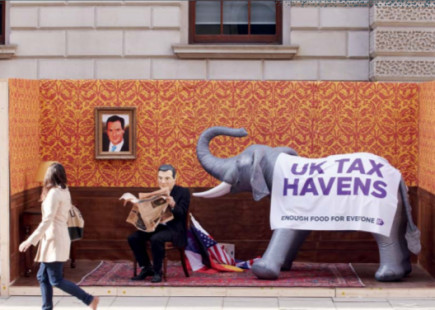
ISDS and tax havens
In addition to structuring their investments to minimise their tax bills – including through the use of tax havens – multinational companies and their teams of corporate lawyers are increasingly also looking at where to strategically place subsidiaries in order to take advantage of trade and investment treaties that give them access to ISDS.
“Investors can structure investments in such a way as to attract optimal treaty protection – for example, by incorporating an intermediary investment vehicle in a state with a [bilateral investment treaty] in force with the host state,” is how the law firm Freshfields Bruckhaus Deringer put it in a briefing on these agreements. “Once a dispute arises investors can use [investment treaties] as leverage in negotiations with the host state.”40
Investors that set up ‘mailbox companies’ in the Netherlands to benefit from its favourable tax regime, for example, can also access the vast web of Dutch investment treaties signed with more than 80 other countries.41 Research published last year revealed how more than 10% of all known investment treaty claims have made use of Dutch agreements – with 75% of these cases “brought on by mailbox companies with no real economic substance in the Netherlands.”42
At least 20 of the UK’s bilateral investment agreements, signed with countries from Belize to Turkmenistan, were expressly extended “by diplomatic notes” to cover investors from Jersey and Guernsey and the Isle of Man, giving companies registered in these tax haven crown dependencies access to ISDS through Britain’s treaties. Several of the UK’s treaties have also been extended to cover investors from Hong Kong, the Cayman Islands, or the Turks and Caicos.43
In one ongoing case, the Canadian mining company Gabriel Resources is using its subsidiary in the tax haven of Jersey to claim protection under a treaty signed between the UK and Romania.44 The company is suing Romania for halting the controversial Rosia Montana gold mine in Transylvania that has been the subject of mass opposition from local communities fearful of its environmental impact.45
Many ISDS cases also involve investments made in developing countries through tax havens. A case brought by the UK company Rurelec against Bolivia, for example, which ended in a multi-million dollar award against the country, centered on investments made by Rurelec in the Bolivian energy sector via intermediaries registered in the British Virgin Islands.46
The threat of TTIP
If passed, TTIP along with the proposed Trans-Pacific Partnership (TPP) deal between the US and countries in the Asia-Pacific region, would dramatically expand the global reach of the ISDS system to cover record levels of global foreign direct investment.47
In response to public outcry – and opposition from some EU member states including Germany – the European Commission has unveiled proposals to reform the ISDS system and replace it with an international Investment Court System. But this actually risks further cementing the system, by making it seem more ‘legitimate’, rather than removing the special facility through which multinationals can challenge laws, regulations, and other state actions taken in the public interest.48
And like other treaties that give multinationals access to this system, TTIP says little about investors’ responsibilities. There is no comparable system of international justice for states to hold multinational corporations to account for their actions, and while expanding corporate power with sweeping rights and protections, investors’ obligations are rarely if ever enshrined in these treaties.
If a state has a dispute with a corporation over its tax bill, it can’t launch an ISDS case – this is a one-way system, accessible only to foreign investors (domestic companies can’t use it either). And of course if a state takes action against a multinational over a tax dispute, it could soon find itself in the dock facing an expensive ISDS claim.
Notes
1. Vodafone vs India (2014), UNCTAD Investment Policy Hub, Investment Dispute Settlement database, http://investmentpolicyhub.unctad.org/ISDS/Details/581
2. Perenco vs Ecuador (2008), UNCTAD Investment Policy Hub, Investment Dispute Settlement database, http://investmentpolicyhub.unctad.org/ISDS/Details/317
3. “Decision on Remaining Issues of Jurisdiction and Liability,” Perenco vs Ecuador, 12 September 2014, http://www.italaw.com/sites/default/files/casedocuments/italaw4003.pdf
4. “ICSID tribunal renders interim decision on Ecuador’s environmental counterclaim in long-running dispute,” Investment Treaty News, 26 November 2015, https://www.iisd.org/itn/2015/11/26/icsid-tribunal-renders-interim-decision-on-ecuadors-environmental-counterclaim-in-long-running-dispute-perenco-ecuador-limited-v-republic-of-ecuador-icsid-case-no-arb-08-6/
5. Micula vs Romania (2005), UNCTAD Investment Policy Hub, Investment Dispute Settlement database, http://investmentpolicyhub.unctad.org/ISDS/Details/180
6. “Awards and Decisions,” Investment Treaty News, 14 May 2014 https://www.iisd.org/itn/2014/05/14/awards-and-decisions-15/
7. “The European Commission prohibits Romania from compliance with an ICSID Award: implications for the enforcement of intra-EU investment treaty awards?” Herbert Smith Freehills Public International Law Notes, 16 April 2015, http://hsfnotes.com/publicinternationallaw/2015/04/16/the-european-commission-prohibits-romania-from-compliance-with-an-icsid-award-implications-for-the-enforcement-of-intra-eu-investment-treaty-awards/
8. Cargill vs Mexico (2005), UNCTAD Investment Policy Hub, Investment Dispute Settlement database, http://investmentpolicyhub.unctad.org/ISDS/Details/204, and Archer Daniels Midland vs Mexico (2004), http://investmentpolicyhub.unctad.org/ISDS/ Details/167, and Corn Products vs Mexico (2004), http://investmentpolicyhub.unctad.org/ISDS/Details/166
9. “Public health cost of global (corn) trade,” Institute for Agriculture and Trade Policy blog, 7 February 2011, http://www.iatp.org/blog/201102/public-health-costof- global-corn-trade
10. “Statement by US Trade Representative Susan C. Schwab on Mexico’s Repeal of Discriminatory Beverage Tax,” Office of the United States Trade Representative, January 2007, https://ustr.gov/about-us/policy-offices/press-office/press-releases/archives/2007/january/statement-us-trade-representative-susan-c
11. Tullow vs Uganda, ICSID website, https://icsid.worldbank.org/apps/icsidweb/cases/ Pages/ casedetail.aspx?caseno=ARB/13/25&tab=PRO
12. Anders Reimers Larsen, “Uganda Revenue Authority vs Tullow,” ActionAid, 17 July 2014, http://www.actionaid. org.br/en/uganda/2014/07/uganda-revenue-authority- vs-tullow
13. “Tullow Oil to Settle Uganda Tax Dispute for $250 Million,” Bloomberg, 22 June 2015, http://www.bloomberg.com/news/articles/2015-06-22/tullow-oil-to-settle-uganda-tax-dispute-for-250-million
14. See, for example: Vattenfall vs Germany (2009), UNCTAD Investment Policy Hub, Investment Dispute Settlement database, http://investmentpolicyhub.unctad.org/ISDS/Details/329, and Phillip Morris vs Uruguay (2010), http://investmentpolicyhub.unctad. org/ISDS/Details/368
15. Longyear vs Canada, UNCTAD Investment Policy Hub, Investment Dispute Settlement database http://investmentpolicyhub.unctad.org/ISDS/Details/570
16. “Ukraine faces trio of claims over gas reforms,” Global Arbitration Review, 16 February 2015, http://globalarbitrationreview.com/news/ article/33551/ukraine-faces-trio-claims-gas-reforms/
17. See annex: List of tax-related ISDS cases, which includes short summaries of the tax-related aspects of 40 cases filed by foreign investors since 1995. In addition to these cases, Spain has been sued in more than 20 separate cases filed by investors in the renewable energy sector, challenging reforms including new taxes and subsidy cuts.
18. “Give Us A Break: How big companies are getting tax free deals,” ActionAid, 2013, http://www.actionaid. org/publications/give-us-break-how-big-companies-are- getting-tax-free-deals
19. “Healthy Revenues: How the extractives industry can support Universal Health Coverage in Sierra Leone,” Health Poverty Action, June 2015, https://www.healthpovertyaction.org/wp-content/uploads/downloads/2015/06/Healthy-Revenuesextractives-industry-Sierra-Leone-report-June-2015.pdf
20. Matthew Hodgson, “Investment Treaty Arbitration: How much does it cost? How long does it take?” Allen & Overy, 18 February 2014, http://www.allenovery.com/ publications/en-gb/Pages/Investment-Treaty-Arbitration- How-much-does-it-cost-How-long-does-it-take-.aspx
21. Successful investors are more likely to recover costs (53%), than successful states (38%), according to research by law firm Allen & Overy. “Investment Treaty Arbitration: How much does it cost? How long does it take?”18 February 2014, http://www.allenovery.com/ publications/en-gb/Pages/Investment-Treaty-Arbitration- How-much-does-it-cost-How-long-does-it-take-.aspx
22. Adrian Rodriguez, “International Arbitration Claims against Domestic Tax Measures Deemed Expropriatory or Unfair and the Inequitable,” IADB Occasional Paper, January 2006, https://publications.iadb.org/bitstream/handle/11319/2746/International%20Arbitration%20Claims%20against%20Domestic%20Tax%20Measures%20Deemed%20Expropriatory%20or%20Unfair%20and%20the%20Inequitable.pdf?sequence=1
23. Matthew Davie, “Taxation-Based Investment Treaty Claims,” Journal of International Dispute Settlement, 11 February 2015, http://jids.oxfordjournals.org/ content/6/1/202.abstract
24. “About Vodafone India,” Vodafone.in website, http://www.vodafone.in/about-us/home
25. “The Vodafone decision – a synopsis,” KPMG News Flash, KPMG in India, 20 January 2012 https://www.kpmg.com/in/en/services/tax/flashnews/ kpmg-flash-news-vodafone-international-holdings-bv.pdf
26. A 2014 IMF policy paper notes: “The tax treatment of gains on indirect transfers of interests in assets is a controversial issue—and one of particular importance to many developing countries.” It says: “The laws of many developing countries need strengthening if they are to tax gains on such indirect transfers.” http://www.imf.org/external/np/pp/eng/2014/050914.pdf
27. “Govt to retrospectively tax Vodafone deal,” Business Today, 16 March 2012, http://www.businesstoday.in/ union-budget-2012-2013/budget-news/budget-2012- vodafone-deal-tax/story/23264.html
28. Vodafone vs India (2014), UNCTAD Investment Policy Hub, Investment Dispute Settlement database, http://investmentpolicyhub.unctad.org/ISDS/Details/581
29. “Open to out-of-court settlement of legacy tax issues: Hasmukh Adhia,” The Economic Times, 27 December 2015, http://articles.economictimes.indiatimes. com/2015-12-27/news/69334717_1_third-arbitrator-yves-fortier- tax-demand
30. Remya Nair and Saurabh Kumar, “New Bilateral Investment Treaty Text Gets Approval,” Livemint.com, 17 December 2015, http://www.livemint.com/Politics/ Di6UHjBQPhJXnf8IMrcrDK/ New-bilateral-investment-treaty- text-gets-approval.html
31. Tom Jones, “Canada NAFTA claimants no longer at loggerheads,” Global Arbitration Review, 17 September 2015, http://globalarbitrationreview.com/ news/article/34148/canada-nafta-claimants-nolonger- loggerheads/
32. See: “Spain – as a respondent state,” UNCTAD Investment Policy Hub, Investment Dispute Settlement database, http://investmentpolicyhub.unctad.org/ ISDS/CountryCases/197?partyRole=2
33. Sebastian Perry, “Emergency award enforced against Ukraine,” 1 July 2015, http://globalarbitrationreview. com/news/article/33936/emergency-award-enforced- against-ukraine/
34. See annex: List of tax-related ISDS cases, eg. EnCana vs Ecuador, Occidental vs Ecuador
35. Kyriaki Karadelis, “Russia faces claim from ExxonMobil,” Global Arbitration Review, 2 April 2015, http://globalarbitrationreview.com/news/article/33695/ russia-faces-claim-exxonmobil/ “Exxon v Russia: What are the possible legal outcomes?” CIS Arbitration Forum, 27 April 2015, http://www.cisarbitration.com/2015/04/27/ exxon-v-russia-what-are-the-possible-legal-outcomes/
36. Energy Charter Treaty, Article 21: Taxation, http://www.ena.lt/pdfai/Treaty.pdf
37. William W Park, “Arbitrability and Tax,” in L Mistelis & S Brekoulakis (eds), Arbitrability: International & Comparative Perspectives, 2009, p. 179-205, http://www.arbitration-icca.org/media/4/54080822237337/media012409314487590tax_and_arbitration_w_w_park.pdf
38. Matthew Davie, “Taxation-Based Investment Treaty Claims,” Journal of International Dispute Settlement, 11 February 2015, http://jids.oxfordjournals.org/ content/6/1/202.abstract
39. Timothy Lyons, “Treaty Arbitration: The limited role of tax carve-outs in BITs,” Global Arbitration Review, 30 July 2015, http://globalarbitrationreview.com/ journal/article/34005/
40. “Bilateral Investment Treaties: Managing the risk of government intervention,” Freshfields Bruckhaus Deringer, June 2010 http://www.freshfields.com/ uploadedFiles/SiteWide/Knowledge /Bilateral%20 investment%20treaties%20Managing%20the%20 risk%20of%20government%20intervention.pdf
41. “Netherlands,” UNCTAD Investment Policy Hub, Investment Dispute Settlement database, http:// investmentpolicyhub.unctad.org/IIA/CountryBits/148 risk%20of%20government%20intervention.pdf
42. “Socialising Losses, Privatising Gains. How Dutch investment treaties harm the public interest,” Roeline Knottnerus, Roos van Os, Hilde van der Pas, Pietje Vervest (2015), TNI, SOMO, Both Ends, MilieuDefensie https://www.tni.org/en/DutchBITs
43. “England & Wales,” Global Arbitration Review, 18 September 2015 http://globalarbitrationreview.com/know-how/topics/66/jurisdictions/65/england-wales/#ftr_28
44. Gabriel Resources vs Romania, UNCTAD Investment Policy Hub, Investment Dispute Settlement database, http://investmentpolicyhub.unctad.org/ISDS/Details/632 The UK-Romania treaty, signed in 1996, was extended “by diplomatic notes” in March 1999 to cover Jersey, Guernsey and the Isle of Man. “England & Wales,” Global Arbitration Review, 18 September 2015 http://globalarbitrationreview.com/know-how/ topics/66/jurisdictions/65/england-wales/#ftr_28
45. Save Rosia Montana Campaign, http://www.rosiamontana.org/
46. “Awards and Decisions,” Investment Treaty News, 14 May 2014 https://www.iisd.org/itn/2014/05/ 14/ awards-and-decisions-15/
47. According to estimates from the Public Citizen NGO in the US, TTIP would enable more than 47,000 US-owned subsidiaries currently operating in the EU to launch ISDS attacks on European policies and government actions. Public Citizen, “Investor-State Attacks against European Policies via CETA and TTIP”, 2014, https://www.citizen.org/documents/EU-ISDS-liability.pdf
48. S2B Network, “ISDS: Courting foreign investors,” 2015 http://www.s2bnetwork.org/isds-courting-foreign-investors/ and Gus Van Harten, “Key Flaws in the European Commission’s Proposals for Foreign Investor Protection in TTIP,” 2015, Osgoode Legal Studies Research Paper No. 61/2015. http://ssrn.com/abstract=2692122

